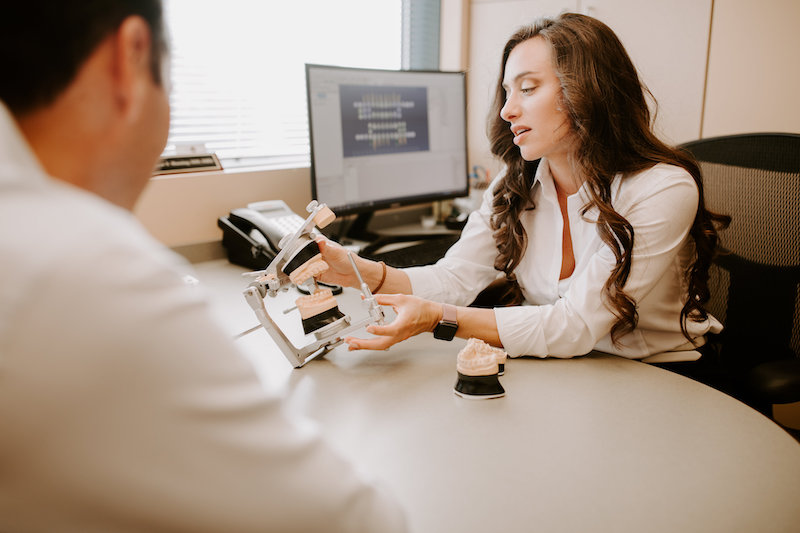Dental Implant Maintenance Tips & Tricks

Whether you've recently undergone dental implant surgery or are considering it in the future, maintaining your dental implants is crucial for their longevity and your oral health.
So, how do you care for your dental implants to prevent complications? What steps can you take to ensure they stand the test of time? At Advanced Dentistry, we’ve prepared a comprehensive guide that will provide answers to these questions, along with expert advice and practical tips from our prosthodontists.
Understanding dental implants
Dental implants are artificial tooth roots made of biocompatible materials, such as titanium. They are surgically placed into the jawbone to support replacement teeth, such as crowns, bridges, or dentures. Unlike traditional dentures, implants offer stability, comfort, and longevity.
The importance of dental implant maintenance
Maintaining your dental implants is crucial for their long-term success. While implants aren’t susceptible to cavities like natural teeth, they’re still susceptible to gum disease and other issues if not properly cared for.
Why is implant maintenance essential?
- Prolonged Lifespan: Well-maintained dental implants can last a lifetime, providing an excellent return on your investment.
- Prevention of Complications: Regular maintenance can help prevent complications such as peri-implantitis, a condition that can lead to implant failure.
- Preservation of Oral Health: Proper implant care contributes to oral health by reducing the risk of infection and inflammation.
Daily dental implant care

Brushing and flossing
Just like natural teeth, dental implants require daily care. Brush your teeth at least twice a day using a soft-bristle toothbrush. Use a toothpaste that contains fluoride, as it helps prevent cavities and gum disease. Flossing is equally important; it removes food particles and plaque from between the teeth and around the implants in places your toothbrush bristles cannot reach.
Pro Tip: Consider using an interdental brush or a water flosser for thorough cleaning around the implant posts.
Mouthwash
Rinsing with an antimicrobial mouthwash can help reduce the risk of infection and keep your breath fresh. However, be sure to choose an alcohol-free mouthwash, as alcohol can be harsh on the soft tissues around the implants.
Dietary considerations for implant maintenance
Maintaining a healthy diet is another key aspect of implant care.
- Limit Sugary Foods: Excessive sugar consumption can lead to plaque buildup, increasing the risk of gum disease. Limit sugary snacks and beverages in your diet.
- Eat Nutrient-Rich Foods: A diet rich in vitamins and minerals supports overall oral health. Foods like leafy greens, dairy products, and lean proteins promote healing and tissue health.
- Avoid Hard and Sticky Foods: While dental implants are strong, they can still be damaged by excessively hard or sticky foods. Avoid chewing on ice or biting down on hard candies to prevent any potential harm.
Stay hydrated
A well-hydrated mouth is less prone to bacterial growth. Make sure to drink plenty of water throughout the day to maintain optimal oral health. Water helps flush away food particles and bacteria, reducing the risk of implant-related complications.
Guard against teeth grinding
Bruxism, or teeth grinding, can exert excessive pressure on your dental implants, potentially leading to damage. If you grind your teeth, consider wearing a nightguard to protect both your natural teeth and implants while you sleep.
Remember, stress can contribute to teeth clenching and grinding. So, we recommend practicing stress management techniques like meditation or yoga to protect your implants from unnecessary strain.
If you find you are unable to reduce stress in your life, or management techniques are not working for you, you may need a night guard or a protective appliance that you wear between your teeth to reduce the amount of force generated on teeth and implants. Additionally, botox in the chewing muscles is a proven technique for reducing bite force, thereby reducing the force on the teeth and implants.
Protect your implants during physical activities
Likewise, if you engage in contact sports or activities that could impact your face, we recommend wearing a mouthguard. This precautionary measure can safeguard your dental implants from unexpected trauma.
Say no to tobacco
Tobacco use, whether smoking or chewing, can have detrimental effects on your dental implants. Nicotine restricts blood flow, which impairs the healing process. Smoking also has a drying effect on the mouth, making it more difficult to remove plaque from the teeth and leading to tartar build up. Both of these increase the risk of implant failure. Quitting tobacco is a significant step towards preserving your dental health.
Regular dental check-ups
Even with diligent at-home care, regular dental check-ups are essential. During these visits, your dentist can:
- Monitor Implant Health: Your dentist will assess the condition of your implants and identify any issues at an early stage.
- Professional Cleaning: Dental professionals can perform deep cleaning around your implants, ensuring that hard-to-reach areas are free of plaque and bacteria.
- Address Concerns: If you have any questions or concerns about your implants, your dental team is there to provide guidance and solutions.
Do you need help with a failing implant?
Should you experience any issues with your dental implants, seek professional help promptly. Common symptoms of implant problems include:
- Looseness
- Discomfort
- Swelling
- Changes in bite
- Visible changes in appearance
At Advanced Dentistry, we can diagnose and address these issues effectively, ensuring your smile remains stunning and functional. Contact us for personalized guidance and prompt assistance with any implant concerns. Your radiant smile is our ultimate goal.
Interested in implants? Need to fix a failing implant? We’ve got you covered!

Your dental implants are a valuable investment in your oral health and overall well-being. By following this maintenance guide, you can feel confident knowing your implants will last a lifetime.
Whether you’re concerned about an existing implant, are seeking information on dental implant care, or are considering getting your first implant, reach out to us at (503) 352-3224 or contact us online to schedule an appointment. We’ll gladly welcome you to our prosthodontist office in Portland, Oregon, where we want to help you maintain that beautiful smile.
